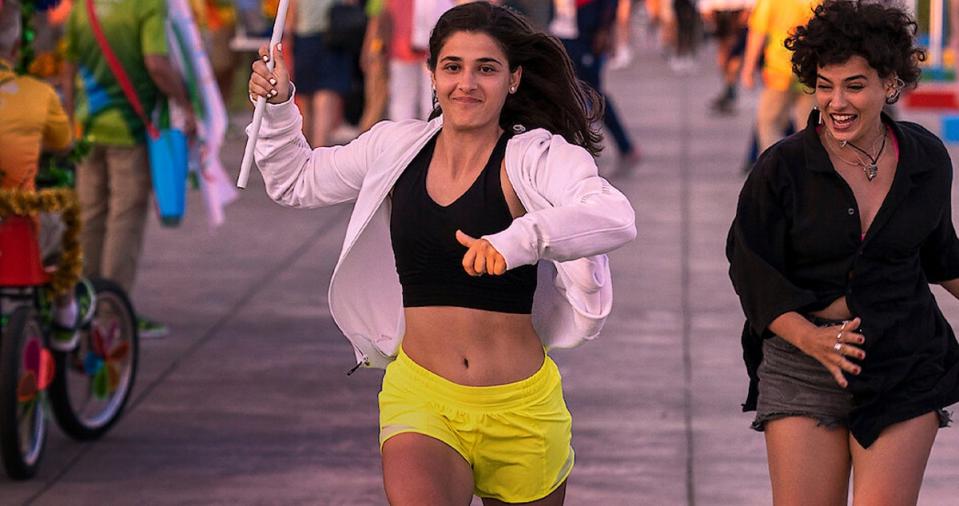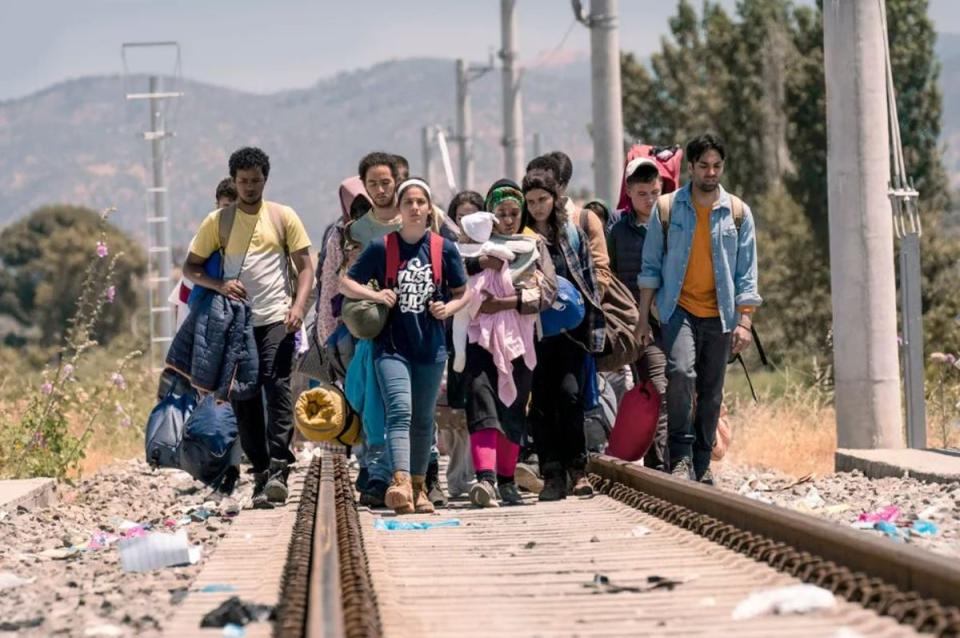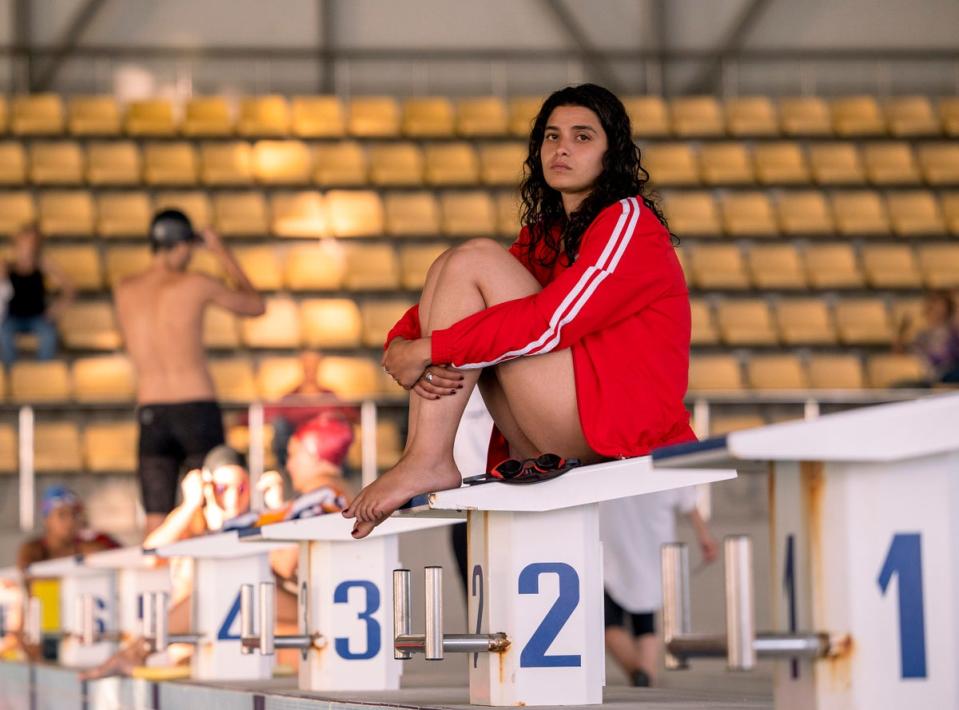‘There’s enough space on this planet for everyone’: Refugee turned Olympian Yusra Mardini on her story that inspired a Netflix drama

- Oops!Something went wrong.Please try again later.
- Oops!Something went wrong.Please try again later.
- Oops!Something went wrong.Please try again later.
On 18 March 2011, protests in Syria came to a violent head after peaceful demonstrators in the southwestern city of Daraa were fired at by armed forces. Three people were killed. That month marked the beginning of a brutal, multi-sided civil war that has since displaced more than 13 million people. Yusra Mardini is one of those people.
Mardini was 13 years old and living in the capital of Damascus when war broke out in her home country. Before then, she had enjoyed a regular life. She spent time with her family and partied with friends on the city’s rooftops. She also swam competitively. Four years after the fighting erupted, Mardini, aged just 17, and her sister, Sara, left for Germany to flee the continuous and indiscriminate violence that blighted their home.
When the motor of the rubber dinghy carrying them and 16 other refugees suddenly stopped in the middle of the Aegean Sea, Sara knew there was too much weight on board to continue. She dived into the cold waters, closely followed by her sister. They swam alongside the boat for three and a half hours before reaching the Greek island of Lesbos.
Netflix’s startling new film The Swimmers – written by Jack Thorne and directed by Sally El Hosaini – chronicles not only that fateful journey, but also the incredible events that followed. Mardini went on to compete at the Olympics twice, in 2016 and 2020. At 19, she became the youngest ever UNHCR ambassador. The Swimmers is an intricate, humanising and sobering depiction of the sisters’ journey to safety, the Syrian revolution, and the realities of the refugee crisis.
The decision to leave the only home they had ever known came down to a simple truth. “Either you risk your life one more time to cross the sea or you stay in Syria and risk your life every day, so we decided to leave,” says Mardini, now 24. “At that point, we had been living in a war for four or five years, and we were just trying to survive.”
Yet she is aware that her story and struggles are not unique. “It was a really difficult journey, and a lot of refugees go through it.” Thousands of others have taken the same route from the Turkish coast to Lesbos in search of safety. Last month, 22 people, including a four-year-old child, died after their boat sank on the same journey. “We were just lucky to make it out alive,” says Mardini.
Verisimilitude was key in the making of the film. The Swimmers stars real-life sisters, French-Lebanese actors Nathalie and Manal Issa, as Yusra and Sara. Likewise, refugees were cast for the scenes showing the sisters’ journey from Damascus to Germany. “Authenticity was really important for me,” says director El Hosaini. Even the smallest details were considered. She replicated the exact T-shirt and headband that Mardini wore on the journey and ensured that the film was in Arabic for the scenes set in Syria.
To watch the Issa sisters’ portrayal of the Mardinis is to be reminded of your own sibling relationships. They capture the intricacies of sisterhood perfectly. “It was a very emotional experience for them. But having that real, human relationship to draw from, for me, as a director... it was a dream,” says El Hosaini. The physical demands of their roles proved the most challenging. Notably, the actors could not swim. Prior to shooting, they underwent intense training, swimming every day for two months.

“Obviously they’re not going to be at an Olympic standard,” says El Hosaini, explaining that she recruited a team of doubles for the Olympic swimming sequences and that Mardini also doubled for herself in the film. “She wanted to do more but she couldn’t because she was training for Tokyo.”
The Mardini sisters were heavily involved in the creation of The Swimmers from start to finish. Script development began with the siblings relaying their life story to El Hosaini and scriptwriter Jack Thorne, then trusting them to tell it with care and accuracy. “Sometimes you just have to trust people and that’s exactly what we did. We didn’t meddle. We didn’t tell them, ‘Oh, don’t do it that way,’” says Mardini. “And then when we felt there was something that we didn’t like, we talked to Sally, and she would explain it to us.”
Both Mardini and El Hosaini hope The Swimmers will not only bring awareness to the plight of refugees – but also humanise their experiences. “It’s very easy to be numbed by numbers,” says El Hosaini. “You hear about all these numbers all the time of people and refugees and it’s easy to forget that they’re human beings. And what cinema does so well is it allows an audience to walk around in someone else’s shoes, and to literally be on the journey with them.”
When you sympathise with someone, you’re an observer observing someone else... But with empathy, which is what I was hoping for with this film, you really put yourself in someone else’s shoes
Every creative decision, down to the type of lens used to shoot the movie, was made with the aim of “removing the film as far away from the images seen in the news” as possible. The goal, El Hosaini says, is not sympathy, but empathy. “We’re used to feeling sympathy when we see those images, but when you sympathise with someone, you’re an observer observing someone else, and there’s a distance between you. But with empathy, which is what I was hoping for with this film, you really put yourself in someone else’s shoes.”
Understanding and education are at the heart of The Swimmers. “It can change everything when one person shows kindness,” says Mardini. “I will remember the kindness shown to me for the rest of my life. In general, we really want people to start helping refugees and understand that this can be you, this can be me, this can be anyone. That’s how we’re going to make an impact.”
That impact is important now more than ever, as anti-refugee and immigration sentiments continue to fester in Britain following reports of “inhuman or degrading treatment” at Manston Asylum Centre in Kent and home secretary Suella Braverman’s comments describing refugees coming to the UK as an “invasion” – a remark El Hosaini calls “disgusting”. “We need to have more nuanced discussion,” she urges. “When you hear this rhetoric coming from government, it’s shameful, really. Refugees are just human beings, like you and me. As a country, I question where our humanity is.”

“I say the UK was built by refugees, too,” adds Mardini. “There’s lots of families that came here, became successful, worked and this is their country, too. It is sad that [Braverman] is very ignorant because refugees are normal people. I’m not saying 100 per cent of refugees are good but this is what the world is… there’s the good, the bad, the people who are going to work and who are not. This is just life.” She continues, “The UK is a great country and it can take a lot of refugees and can help them rebuild their lives and integrate. I feel like they have a lot to contribute to the society here. I really hope that Suella Braverman meets more refugees to get to know them. Maybe if I meet her one day, I can change her mind.”

The Swimmers shows a different perspective to Braverman’s. “I hope people’s minds are opened a bit and when they hear certain rhetoric, they realise there’s another side to this story. That it’s not black and white; it’s shades of grey,” says El Hosaini. Mardini sums it up nicely: “They’re going to be crying a lot.” Perhaps The Swimmers will remind viewers that anyone could become a refugee at any moment. “We don’t choose to become refugees. We become refugees because of fleeing war and violence, and when I fled, I thought about my family and I wanted them to be safe and when my mum let me go across the countries and seas, she did so because she wanted me and my sister to be OK and grow up in a good environment.”
When Mardini fled her home in Damascus seven years ago, she thought of her future children. “I don’t want them to be born in a country where I don’t know if they’re going to come back home or not,” she says. “I really hope that viewers understand that they can really help and that there is enough space on this planet for everyone.”
‘The Swimmers‘ is out on Netflix now

